2015年12月大学英语四级作文题目:留学利弊
出国留学利弊英语作文

出国留学利弊英语作文1Studying abroad is good or badRecent years, more and more Chinese people have chosen tostudy abroad. To this tendency, some people think it is not good, as most of the overseas learners do not come back, whereas I hold a different opinion.In my opinion, it is a good thing that more Chinese people go abroad. There are three reasons. First, the overseas learners can improve their ability through the study. They can grasp advanced technologies and their language ability can be improved as well. Second, with the rapid development of China, more and more overseas learners will choose come back, using their abundant knowledge studied abroad to serve for the motherland. The third, the government and most domestic enterprises are willing to provide favorable treatments to attract them to come back.Although some do not want to come home, we are glad to seethat there are more overseas learners chosen to work at home than before. For the above reasons, I think it is not a bad thing for more and more Chinese study abroad.2Studying abroad is good or badWhen you choose to study abroad, you are making an investment for your future. You will be looing for a qualification that will encance your career prospects, and a word-class international university will support you in your studies.You will be taught by experts in each subject, with national and international research reputations so you will benefit fromthe latest thinking in all subject areas.Is this what you want?3Studying abroad is good or badThe advantages of going abroad to study:1. A perfect chance to broad our horizon. We will have the chance to get close to different culture and different people. During our stay in other countries, we can view exoticscenery and different values of other people, which will deeply affect our future value about the world and personal life, as well as job expectation.2. We way get rid of some bad habits, such as laziness,lacking of the concept of time. Our moral ideas and some bad habits will also be improved, for that we represent our own country when we’re abroad.3. A good test for our courage, independence and perseverance. Going abroad can be a very good training to enhance goodspirit in hardship.4. The education system of developed country is more advanced than ours. We can get more knowledge in a better-equipped educational environment.5. Practice an authentic language. The best way to learn a language well is to get involved in its language environment and experience it by ourselves.6. It’s hard to find an ideal job with a bachelor’s degree. Going abroad for a further education to obtain a gold-plated diploma is a better choice than having postgraduate study domestically.The disadvantages of going abroad to study:1. It is a kind of gambling, which st akes our youth, parents’ savings, and future. We will feel a lot of pressure, and haveto count on ourselves.2. The foreign life can be really different than we imagine.We will have to be adapted to completely new life styles, new social environments and new people. Also, be aware of facing culture shock everywhere.3. The high consumption often makes us having financial problem.4. We will find it hard to get truly involved into foreign society and local students’ lives.5. Foreign universities mostly hold "wide into severe piece" policy. We will find that it is so difficult to graduate,even sometimes we may think of giving up.6. The hardest obstacle to overcome is the deep "homesickness". We will know the feeling when calling mom and saying "mom, every thing is perfect. Don't worry,” whilecrying into tears!7. When we get back, we will find that our friends alreadyhave our dreamed jobs and families. What we have, however, is just a diploma, and we have to start from scratch... Bummer!4Studying abroad is good or badAdvantages:It widens students' knowledge and horizons, meanwhile cultivats their independence and personalities.learn advanced knowledge and experience. Providesopportunities to students, who can learn advanced management experience. Then students have to deal with many problems whey they study abroad, thdy have to learn how to be accustomed to a new environment and how to get well with the teachers and classmates.By communicating with foreign students, they will see the differences from their own. Finally, can provide a good language environment and make it easy to pick up a language.Disadvantages: students will confronted with many phychological problems. they feel lonely and helpness in a new environment.Futhermore, the tuition is too much , which is a heavy financial burden to the average people. Not only that, students may also experience homesickness when away from their families so long.5留学的好处英语作文There are some advantages and disadvantages in studying abroad. In my opinion, I'm in favour of studying abroad.First of all, If we live with a local family, we will communicate with each other. In this way, we have more chances to practise speaking English. Besides, we can learn more aout Western culture and customs. What's more, we will have a good job with diploma in the future. However, some people are against studying abroad. In their opinion, first, studying abroad is too expensive. In addition, Since it's too far away and we aren't familiar with the environment. We will feel lonely. What's more, Since we 're unfamiliar with Western culture and customs, we may be not used to the food, the way of communication and teaching methods and so on.。
评价出国留学的利弊英语作文

评价出国留学的利弊英语作文The Pros and Cons of Studying Abroad.Studying abroad presents a unique opportunity for individuals to expand their horizons, gain cross-cultural understanding, and pursue academic and personal growth. However, this experience is not without its challenges and drawbacks. In this essay, I will explore the benefits and costs of studying abroad, discussing both the positive and negative aspects of this international educational endeavor.Benefits of Studying Abroad.1. Cultural Immersion: Studying abroad offers an unparalleled opportunity to immerse oneself in a new culture. Living and learning in a foreign country exposes students to different values, traditions, and ways of life. This cultural immersion enhances their understanding of the world and cultivates a more global perspective.2. Language Acquisition: For many students, studying abroad is the best way to learn a new language. Immersionin a foreign language environment accelerates language acquisition and improves fluency. This skill is invaluable in today's interconnected world, where proficiency in multiple languages can open doors to career opportunities and cultural exchanges.3. Personal Development: Studying abroad promotes personal growth and development. Living independently in a foreign country requires students to adapt to new environments, solve problems, and make decisions. These experiences foster resilience, self-confidence, and interpersonal skills.4. Expanded Academic Options: Studying abroad often provides access to a broader range of academic programs and courses than may be available domestically. Students can explore fields of study that are unique or more advanced than those offered at their home institutions.5. Professional Networking: Studying abroad offersstudents the chance to build professional networks with peers and mentors from around the globe. These networks can be invaluable in future career development, providing access to job opportunities, internships, and mentorship programs.Costs of Studying Abroad.1. Financial Burden: Studying abroad can be a significant financial investment. Tuition fees, living expenses, and travel costs can be prohibitively expensive for many students and families. While scholarships and grants may offset some of these expenses, the financial burden can still be substantial.2. Cultural Clash: While cultural immersion is a significant benefit of studying abroad, it can also lead to cultural clash. Differences in values, norms, and expectations can be jarring for students who are not accustomed to them. Navigating these differences can be challenging and emotionally draining.3. Isolation and Homesickness: Studying abroad often requires students to leave their families and friends behind. This can lead to feelings of isolation and homesickness, particularly during the initial adjustment period. Students must learn to cope with these emotions and find ways to connect with their new environment.4. Language Barrier: While studying abroad is an excellent opportunity to learn a new language, the language barrier can be a significant challenge. Communication difficulties can affect academic performance, social integration, and day-to-day life. Students must be willing to put in the effort to overcome this barrier through practice and language courses.5. Uncertainty and Risk: Studying abroad involves a degree of uncertainty and risk. Political instability, natural disasters, and other unexpected events can disrupt study plans and affect student safety. While most institutions strive to mitigate these risks, students must be prepared to navigate unexpected challenges and make informed decisions about their safety and well-being.In conclusion, studying abroad offers numerous benefits that can transform students' academic and personal lives. However, it is not without its costs and challenges. Students considering this option must carefully weigh the pros and cons, considering their financial situation, personal goals, and readiness to embrace the unique challenges and opportunities of studying abroad.。
留学的优点和缺点英文四级作文
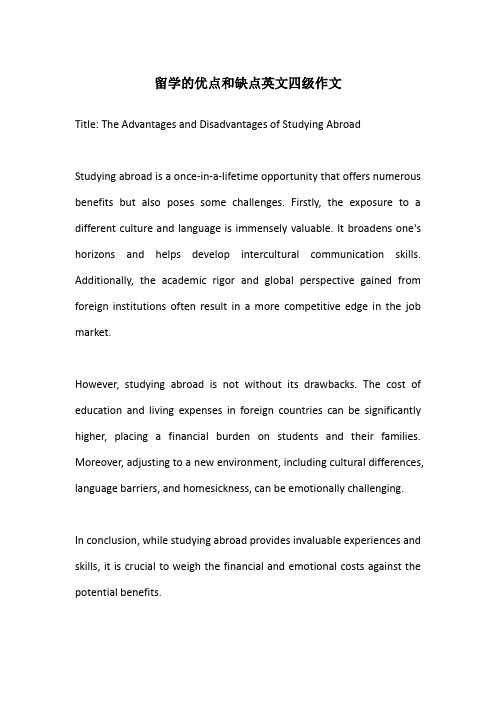
留学的优点和缺点英文四级作文Title: The Advantages and Disadvantages of Studying AbroadStudying abroad is a once-in-a-lifetime opportunity that offers numerous benefits but also poses some challenges. Firstly, the exposure to a different culture and language is immensely valuable. It broadens one's horizons and helps develop intercultural communication skills. Additionally, the academic rigor and global perspective gained from foreign institutions often result in a more competitive edge in the job market.However, studying abroad is not without its drawbacks. The cost of education and living expenses in foreign countries can be significantly higher, placing a financial burden on students and their families. Moreover, adjusting to a new environment, including cultural differences, language barriers, and homesickness, can be emotionally challenging.In conclusion, while studying abroad provides invaluable experiences and skills, it is crucial to weigh the financial and emotional costs against the potential benefits.翻译:留学的优点和缺点留学是一次千载难逢的机会,它提供了许多好处,但同时也带来了一些挑战。
出国留学利弊英文作文
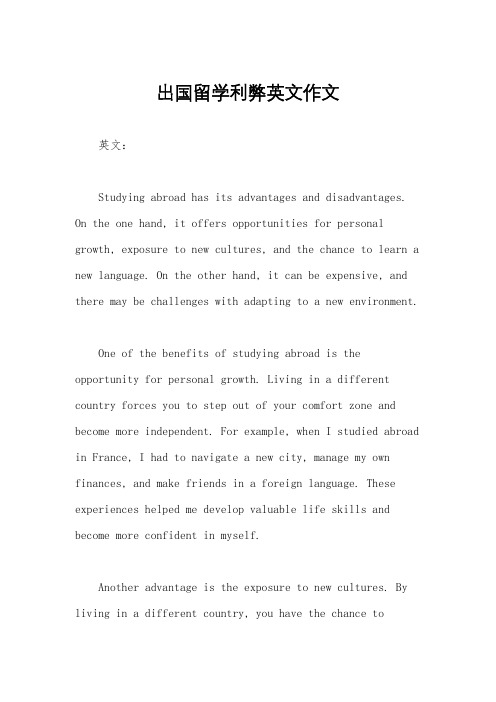
出国留学利弊英文作文英文:Studying abroad has its advantages and disadvantages. On the one hand, it offers opportunities for personal growth, exposure to new cultures, and the chance to learn a new language. On the other hand, it can be expensive, and there may be challenges with adapting to a new environment.One of the benefits of studying abroad is the opportunity for personal growth. Living in a different country forces you to step out of your comfort zone and become more independent. For example, when I studied abroad in France, I had to navigate a new city, manage my own finances, and make friends in a foreign language. These experiences helped me develop valuable life skills and become more confident in myself.Another advantage is the exposure to new cultures. By living in a different country, you have the chance toimmerse yourself in a new way of life and gain a deeper understanding of the world. For instance, during my time in Japan, I was able to participate in traditional tea ceremonies, visit ancient temples, and learn about the customs and traditions of the Japanese people. These experiences broadened my perspective and enriched my lifein ways that would not have been possible if I had stayedin my home country.However, studying abroad also has its drawbacks. One of the main disadvantages is the cost. Tuition, living expenses, and travel can add up to a significant financial burden. Additionally, there may be unexpected expenses, such as medical emergencies or visa issues, that canfurther strain your budget. When I studied in Australia, I had to carefully budget my money and make sacrifices in order to afford my living expenses. It was a challenging experience that taught me the value of financial responsibility.Another downside is the challenge of adapting to a new environment. Language barriers, cultural differences, andhomesickness can make the adjustment period difficult. For example, when I first arrived in Germany, I struggled to communicate with locals and felt isolated from my friends and family back home. It took time and effort to overcome these obstacles and feel at home in my new surroundings.In conclusion, studying abroad has both advantages and disadvantages. It offers opportunities for personal growth and cultural enrichment, but it can also be expensive and challenging. Despite the drawbacks, the experience of studying abroad is invaluable and has the potential to positively impact your life in countless ways.中文:出国留学有其利与弊。
出国留学好处和弊端英语作文
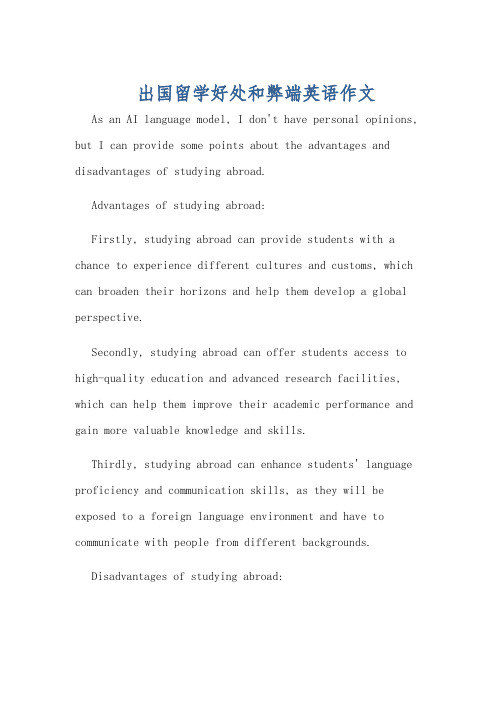
出国留学好处和弊端英语作文As an AI language model, I don't have personal opinions, but I can provide some points about the advantages and disadvantages of studying abroad.Advantages of studying abroad:Firstly, studying abroad can provide students with a chance to experience different cultures and customs, which can broaden their horizons and help them develop a global perspective.Secondly, studying abroad can offer students access to high-quality education and advanced research facilities, which can help them improve their academic performance and gain more valuable knowledge and skills.Thirdly, studying abroad can enhance students' language proficiency and communication skills, as they will be exposed to a foreign language environment and have to communicate with people from different backgrounds.Disadvantages of studying abroad:Firstly, studying abroad can be very expensive,including tuition fees, accommodation, food, transportation, and other expenses, which can put a heavy financial burden on students and their families.Secondly, studying abroad can be challenging, asstudents may face various difficulties and obstacles, such as cultural shock, language barriers, homesickness, and academic pressure, which can affect their mental health and well-being.Thirdly, studying abroad may also pose risks tostudents' safety and security, as they may encounterdifferent social and political situations, such as discrimination, racism, violence, and terrorism, which can endanger their personal safety and health.总之,出国留学有其利有其弊,需要学生根据自身情况和需求来做出决策,并做好充分的准备和规划,以克服各种挑战和迎接各种机遇。
出国留学的好处和坏处英语作文
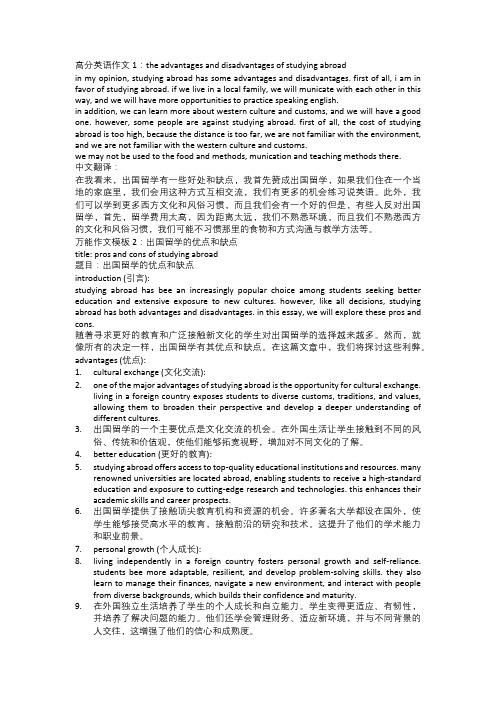
高分英语作文1:the advantages and disadvantages of studying abroadin my opinion, studying abroad has some advantages and disadvantages. first of all, i am in favor of studying abroad. if we live in a local family, we will municate with each other in this way, and we will have more opportunities to practice speaking english.in addition, we can learn more about western culture and customs, and we will have a good one. however, some people are against studying abroad. first of all, the cost of studying abroad is too high, because the distance is too far, we are not familiar with the environment, and we are not familiar with the western culture and customs.we may not be used to the food and methods, munication and teaching methods there.中文翻译:在我看来,出国留学有一些好处和缺点,我首先赞成出国留学,如果我们住在一个当地的家庭里,我们会用这种方式互相交流,我们有更多的机会练习说英语。
出国留学有利有弊 英语作文四级
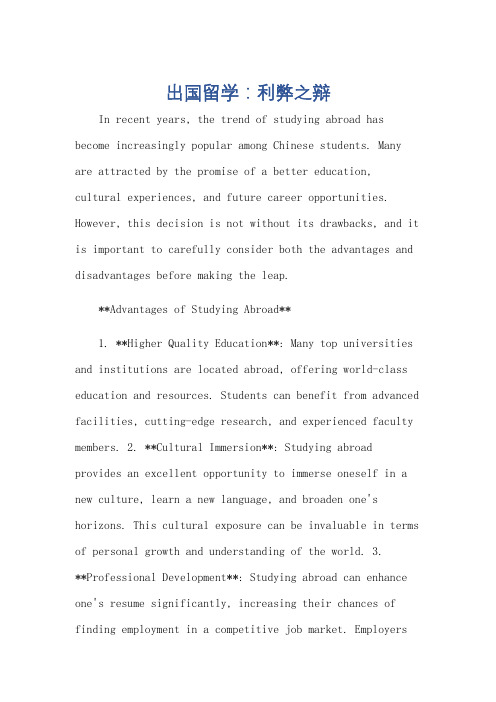
出国留学:利弊之辩In recent years, the trend of studying abroad has become increasingly popular among Chinese students. Many are attracted by the promise of a better education,cultural experiences, and future career opportunities. However, this decision is not without its drawbacks, and it is important to carefully consider both the advantages and disadvantages before making the leap.**Advantages of Studying Abroad**1. **Higher Quality Education**: Many top universities and institutions are located abroad, offering world-class education and resources. Students can benefit from advanced facilities, cutting-edge research, and experienced faculty members.2. **Cultural Immersion**: Studying abroad provides an excellent opportunity to immerse oneself in a new culture, learn a new language, and broaden one's horizons. This cultural exposure can be invaluable in terms of personal growth and understanding of the world.3.**Professional Development**: Studying abroad can enhance one's resume significantly, increasing their chances of finding employment in a competitive job market. Employersoften value the international experience and skills gained abroad. 4. **Networking Opportunities**: Studying abroad opens up a world of networking opportunities. Students can meet people from diverse backgrounds, create meaningful relationships, and build a global network that can be beneficial in their future careers.**Disadvantages of Studying Abroad**1. **High Financial Cost**: Studying abroad can be expensive, with tuition fees, accommodation, living expenses, and travel costs all adding up. This financial burden can be a significant deterrent for many students.2. **Cultural Barriers**: While cultural immersion is a benefit, it can also present challenges. Language barriers, differences in customs and traditions, and adjustment to a new way of life can be stressful and difficult to overcome.3. **Isolation and Homesickness**: Being in a foreign country can lead to feelings of isolation and homesickness. The lack of familiar faces, places, and routines can be challenging for some students.4. **Job Prospects**: While studying abroad can enhance one's resume, it does not guarantee employment upon graduation. The job market can becompetitive, and finding a suitable job can be challenging, especially if the student opts to stay in the host country. **Conclusion**Studying abroad offers numerous benefits but also comes with its challenges. It is crucial for students tocarefully consider their goals, financial situation, and personal readiness before making the decision to study abroad. By doing so, they can ensure that they make the most of this opportunity and gain valuable experiences that will benefit them in the long run.**出国留学:利弊之辩**近年来,出国留学已成为中国学生中越来越流行的趋势。
国外留学的好坏处英语作文

国外留学的好坏处英语作文English:Studying abroad has both advantages and disadvantages. One of the main benefits is the opportunity to immerse yourself in a new culture and language, which can broaden your horizons and enhance your global perspective. Additionally, studying abroad allows you to gain independence, self-reliance, and problem-solving skills as you navigate a foreign environment. On the other hand, one of the drawbacks of studying abroad is the potential for homesickness, cultural shock, and feeling of loneliness, especially if you are far away from family and friends. Moreover, studying abroad can be expensive, and there may be challenges in adapting to a new educational system and different teaching methods. Overall, studying abroad can be a life-changing experience that offers personal and academic growth, but it also comes with its own set of challenges and difficulties.中文翻译:出国留学有其优点和缺点。
出国留学的优点和缺点英语作文
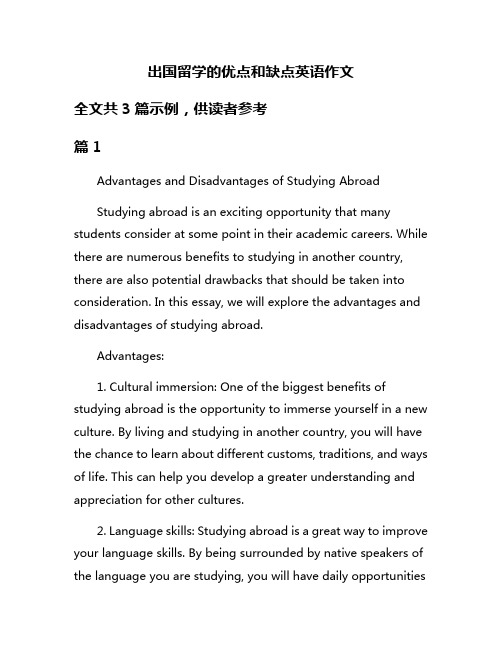
出国留学的优点和缺点英语作文全文共3篇示例,供读者参考篇1Advantages and Disadvantages of Studying AbroadStudying abroad is an exciting opportunity that many students consider at some point in their academic careers. While there are numerous benefits to studying in another country, there are also potential drawbacks that should be taken into consideration. In this essay, we will explore the advantages and disadvantages of studying abroad.Advantages:1. Cultural immersion: One of the biggest benefits of studying abroad is the opportunity to immerse yourself in a new culture. By living and studying in another country, you will have the chance to learn about different customs, traditions, and ways of life. This can help you develop a greater understanding and appreciation for other cultures.2. Language skills: Studying abroad is a great way to improve your language skills. By being surrounded by native speakers of the language you are studying, you will have daily opportunitiesto practice and improve your language skills. This can be particularly helpful for students studying languages such as Spanish, French, or Mandarin.3. Personal growth: Studying abroad can be a transformative experience that helps you grow personally and academically. By stepping outside of your comfort zone and navigating a new environment, you will develop important skills such as independence, adaptability, and resilience.4. Career opportunities: Studying abroad can also boost your career prospects. Employers often value candidates who have international experience, as it demonstrates that you areopen-minded, resourceful, and able to work effectively in diverse environments. Studying abroad can also help you build a global network of contacts that can be beneficial for your future career.5. Travel opportunities: Studying abroad provides you with the chance to travel and explore new places. Whether it's weekend trips to nearby cities, or longer excursions during school breaks, studying abroad offers a unique opportunity to see the world and expand your horizons.Disadvantages:1. Cost: One of the biggest drawbacks of studying abroad is the cost. Tuition fees, accommodation, food, transportation, and other expenses can add up quickly, making studying abroad a significant financial investment. Additionally, currency exchange rates and fluctuating living costs can make it difficult to budget effectively.2. Homesickness: Being away from home and loved ones can be challenging, particularly if you are studying in a country with a different culture and language. Feelings of homesickness can be difficult to cope with, and may impact your academic performance and overall well-being.3. Language barrier: While studying abroad can help you improve your language skills, it can also pose a challenge if you are not fluent in the language spoken in the host country. Communication difficulties can make it harder to form relationships, navigate everyday tasks, and succeed academically.4. Cultural differences: Adjusting to a new culture can be a difficult and sometimes frustrating process. Different customs, values, and social norms may be unfamiliar or even contradictory to what you are used to, which can lead to misunderstandings and cultural clashes.5. Academic challenges: Studying in a foreign educational system can present academic challenges, such as different teaching styles, grading systems, and course requirements. Adapting to these differences can be time-consuming and stressful, and may require additional support and resources.In conclusion, studying abroad offers a wealth of benefits, from cultural immersion and language skills to personal growth and career opportunities. However, it also comes with potential drawbacks, such as cost, homesickness, language barriers, cultural differences, and academic challenges. Before deciding to study abroad, it is important to carefully consider these factors and weigh the pros and cons to determine if studying abroad is the right choice for you.篇2Advantages and Disadvantages of Studying AbroadIn recent years, studying abroad has become an increasingly popular option for students looking to further their education. While there are many advantages to studying in a foreign country, there are also some drawbacks that should be considered. In this essay, we will explore the advantages and disadvantages of studying abroad.One of the main advantages of studying abroad is the opportunity to immerse yourself in a new culture. By living and studying in a foreign country, you can gain a deeper understanding of the local customs, traditions, and way of life. This can help you develop a more global perspective and improve your cross-cultural communication skills. Additionally, studying abroad can open up new opportunities for personal and professional growth, as you may be exposed to different ways of thinking and new experiences that can help you broaden your horizons.Another advantage of studying abroad is the chance to learn a new language. Many students choose to study in a country where the language spoken is different from their own, which can provide a valuable opportunity to become fluent in a second language. This can be a valuable skill in today's globalized world, as being bilingual or multilingual can give you a competitive edge in the job market and open up new career opportunities.Furthermore, studying abroad can also help you develop important life skills such as independence, adaptability, and resilience. Living in a foreign country can be challenging at times, as you may face language barriers, cultural differences, and homesickness. However, overcoming these challenges can helpyou become more self-reliant and confident in your abilities to handle new situations. Studying abroad can also help you build a network of international contacts, which can be beneficial for your future career prospects.Despite the many advantages of studying abroad, there are also some disadvantages that should be considered. One of the main drawbacks is the cost of studying in a foreign country. Tuition fees, living expenses, travel costs, and other expenses can add up quickly, making studying abroad a costly undertaking. Additionally, some students may struggle with feelings of homesickness or loneliness while living in a foreign country, particularly if they are far away from their family and friends.Another disadvantage of studying abroad is the potential for academic challenges. The education system in a foreign country may be different from what you are used to, which can make it difficult to adjust to a new learning environment. Additionally, language barriers or cultural differences may make it harder for you to succeed academically, especially if you are not fluent in the local language. It may also be challenging to navigate the administrative processes and requirements of studying in a foreign country, which can be time-consuming and stressful.In conclusion, studying abroad can offer many benefits, such as cultural immersion, language learning, and personal growth. However, it is important to be aware of the potential drawbacks, such as the high cost, academic challenges, and homesickness. Before deciding to study abroad, it is important to weigh the pros and cons carefully and consider how the experience will fit into your overall academic and career goals. Ultimately, studying abroad can be a valuable and rewarding experience, but it is important to be prepared for the challenges that may arise.篇3Advantages and Disadvantages of Studying AbroadStudying abroad has become increasingly popular among students in recent years. There are many benefits to studying in a foreign country, such as gaining a global perspective, experiencing a new culture, and improving language skills. However, there are also challenges and drawbacks that come with studying abroad. In this essay, we will explore the advantages and disadvantages of studying abroad.Advantages:1. Global perspective: Studying abroad allows students to gain a broader understanding of the world and different cultures.By living in a foreign country, students are exposed to new ideas, beliefs, and customs, which can help them develop a more open-minded and global perspective.2. Language skills: One of the biggest advantages of studying abroad is the opportunity to improve language skills. Immersing oneself in a foreign language environment can greatly enhance language proficiency and fluency, making it easier to communicate with people from different backgrounds.3. Personal growth: Studying abroad challenges students to step out of their comfort zones and adapt to new environments. This can help students develop independence, resilience, and self-confidence, as they navigate unfamiliar territories and overcome obstacles on their own.4. Career opportunities: Studying abroad can enhance a student's resume and attract employers who value international experience. Global experience is becoming increasingly important in today's interconnected world, and studying abroad can provide students with a competitive edge in the job market.5. Cultural experiences: Studying abroad allows students to immerse themselves in a different culture, from trying new foods to participating in local festivals and traditions. This can be aenriching and eye-opening experience that broadens one's understanding of the world.Disadvantages:1. Homesickness: Being away from home for an extended period of time can be challenging, and many students experience feelings of homesickness when studying abroad. Missing family and friends, as well as familiar surroundings, can make it difficult to adjust to life in a foreign country.2. Language barrier: While studying abroad can improve language skills, it can also be a barrier to communication and understanding. Students may struggle to express themselves or understand others, especially in academic settings where specialized vocabulary is used.3. Cultural differences: Adjusting to a new culture can be overwhelming, with unfamiliar social norms, customs, and expectations. Students may experience culture shock and find it difficult to navigate social interactions or daily life in a foreign country.4. Financial challenges: Studying abroad can be expensive, with tuition fees, living expenses, travel costs, and other expenses adding up quickly. This can put a strain on students'finances and make it difficult to afford basic necessities or extracurricular activities.5. Academic differences: Studying abroad may require students to adjust to a different academic system, with different teaching styles, assessment methods, and expectations. This can be challenging for students who are used to a specific way of learning and may struggle to adapt to new requirements.In conclusion, studying abroad offers many advantages, from gaining a global perspective to improving language skills and expanding cultural experiences. However, it also comes with challenges and drawbacks, such as homesickness, language barriers, cultural differences, financial challenges, and academic differences. It is important for students to weigh the pros and cons of studying abroad carefully and prepare themselves for the opportunities and challenges that lie ahead. Ultimately, studying abroad can be a transformative and rewarding experience that broadens horizons and opens doors to new possibilities. (Word count: 478)。
出国留学的利弊英语作文
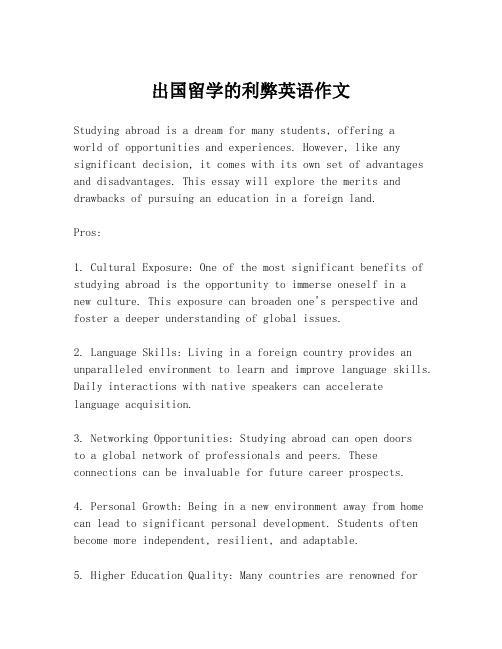
出国留学的利弊英语作文Studying abroad is a dream for many students, offering aworld of opportunities and experiences. However, like any significant decision, it comes with its own set of advantages and disadvantages. This essay will explore the merits and drawbacks of pursuing an education in a foreign land.Pros:1. Cultural Exposure: One of the most significant benefits of studying abroad is the opportunity to immerse oneself in anew culture. This exposure can broaden one's perspective and foster a deeper understanding of global issues.2. Language Skills: Living in a foreign country provides an unparalleled environment to learn and improve language skills. Daily interactions with native speakers can accelerate language acquisition.3. Networking Opportunities: Studying abroad can open doorsto a global network of professionals and peers. These connections can be invaluable for future career prospects.4. Personal Growth: Being in a new environment away from home can lead to significant personal development. Students often become more independent, resilient, and adaptable.5. Higher Education Quality: Many countries are renowned fortheir high-quality education systems, offering specialized courses and research opportunities that may not be available at home.Cons:1. Financial Burden: Studying abroad can be expensive.Tuition fees, living expenses, and travel costs can add up quickly, putting a strain on students and their families.2. Cultural Shock: Adjusting to a new culture can be challenging. The initial excitement can fade, leaving students feeling homesick and out of place.3. Academic Challenges: Different educational systems and teaching styles can be difficult to navigate. Students may struggle to adapt to new academic expectations and grading systems.4. Limited Social Circle: It can be hard to make friends and establish a social network in a new country. Some students may feel isolated and lonely.5. Career Uncertainty: After completing their studies, some students face uncertainty regarding their career prospects. The decision to return home or stay abroad can be a difficult one.In conclusion, studying abroad is a complex decision that requires careful consideration of both the benefits and the challenges. While it can be a life-changing experience thatoffers personal growth and professional advantages, it also comes with financial and emotional costs. Ultimately, the decision should be based on individual goals, financial means, and personal resilience.。
大学英语作文:留学的利弊
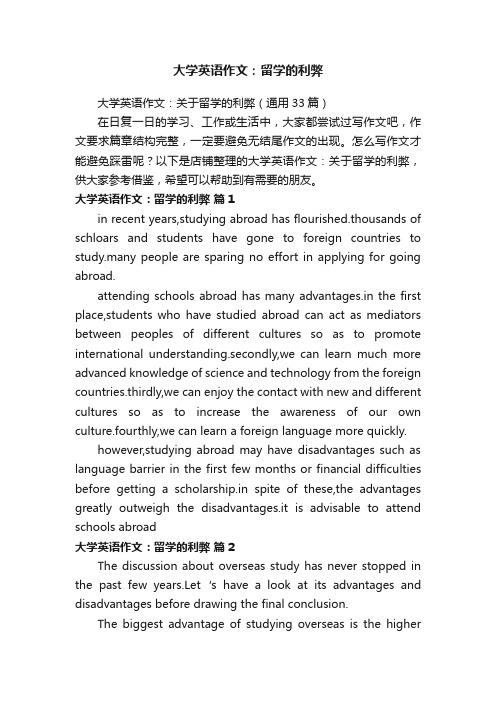
大学英语作文:留学的利弊大学英语作文:关于留学的利弊(通用33篇)在日复一日的学习、工作或生活中,大家都尝试过写作文吧,作文要求篇章结构完整,一定要避免无结尾作文的出现。
怎么写作文才能避免踩雷呢?以下是店铺整理的大学英语作文:关于留学的利弊,供大家参考借鉴,希望可以帮助到有需要的朋友。
大学英语作文:留学的利弊篇1in recent years,studying abroad has flourished.thousands of schloars and students have gone to foreign countries to study.many people are sparing no effort in applying for going abroad.attending schools abroad has many advantages.in the first place,students who have studied abroad can act as mediators between peoples of different cultures so as to promote international understanding.secondly,we can learn much more advanced knowledge of science and technology from the foreign countries.thirdly,we can enjoy the contact with new and different cultures so as to increase the awareness of our own culture.fourthly,we can learn a foreign language more quickly.however,studying abroad may have disadvantages such as language barrier in the first few months or financial difficulties before getting a scholarship.in spite of these,the advantages greatly outweigh the disadvantages.it is advisable to attend schools abroad大学英语作文:留学的利弊篇2The discussion about overseas study has never stopped in the past few years.Let‘s have a look at its advantages and disadvantages before drawing the final conclusion.The biggest advantage of studying overseas is the higheracademic level and advanced research facilities.What’s more,by understanding a new culture and meeting different people,students can develop a more reasonable and balanced view towards the st but not least,the experience will be invaluable to character building,which makes most students more independent,diligent and enterprising.However,the negative effects are also obvious.To begin with,if a person does not make full preparations before going abroad,he will have great difficulty adapting to the new environment.In the second place,the cultural differences will hinder the regular life in many ways.Finally,money is always a big problem.Many students have to find part瞭ime jobs to earn money to pay tuition and fees.In conclusion,the advantages of overseas study outweigh disadvantages.Once they return home,the overseas students will make great contributions to our motherland.大学英语作文:留学的利弊篇3Nowadays,many people like to study abroad.Studying abroad is often considered as a great opportunity which will lead to bright future in one's ride of passage.Not only can we learn different cultures and knowledgefromforeign countries,studying abroad can also eich our lives.One coin has two sides.Likewise,different people have different minds.Conservative and negative concerns about studying abroad have been gradually emergingfromour society.People start to wonder what goes wrong with studying abroad.There are a couple of issues worth of our discussions.Disadvantages of studying abroad may affect one's life culturally and economically.We Chinese will experience cultural shocks if we study abroad and live in another country.Some peers may not be able to adapt to a newenvironment of their studying and living,which may be very differentfromthat of theirs.Life is beautiful,and it is hard.If one does notfeel comfortable with the new culture of another country,he will not be happy about studying in that country.In addition,studying abroad can cost students a great deal of living expenses.Some Chinese students are so academically successful that they receive scholarships in their studies.However,most peers who study abroad do not receive scholarships.Furthermore,they have to deal with many unexpected hardships by living awayfromtheir parents and homeland.For example,medical insurance,daily foods,clothes,rents and transportation can generate a large amount of living expenses.Often time,they need to heavily dependon their parents' overseas monthly payments.I have discussed some benefits and disadvantages of studying abroad.Life is not easy that we know.My belief is that for those students who study abroad should build strong characters in facing of unexpected difficulties in their life.大学英语作文:留学的利弊篇4There are some advantages and disadvantages in studying abroad.In my opinion,I'm in favour of studying abroad.First of all,If we live with a local family,wewill communicate with each other.In this way,we have more chances to practise speaking English.Besides,we can learn more aout Western culture and customs.What's more,we will have a good job with diploma in the future.However,some people are against studying abroad.In their opinion,first,studying abroad is too expensive.In addition,Since it's too far away and we aren't familiar with the environment.We will feel lonely.What's more,Since we 're unfamiliar with Westernculture and customs,we may be not used to the food,the wayof communication and teaching methods and so on.大学英语作文:留学的利弊篇5There are some advantages and disadvantages in studying abroad.In my opinion,I'm in favour of studying abroad.First of all,If we live with a local family,wewill communicate with each other.In this way,we have more chances to practise speaking English.Besides,we can learn more aout Western culture and customs.What's more,we will have a good job with diploma in the future.However,some people are against studying abroad.In their opinion,first,studying abroad is too expensive.In addition,Since it's too far away and we aren't familiar with the environment.We will feel lonely.What's more,Since we 're unfamiliar with Western culture and customs,we may be not used to the food,the wayof communication and teaching methods and so on.大学英语作文:留学的利弊篇6In recent years more and more high school students study abroad during the holidays.Studying abroad is beneficial to them.First of all,it will open their mind and enrich their experience.In addition,it is a good chance to learn new culture and make new friends,which can improvetheir communication skills.However,it will take parents a lot of money to sendtheir children abroad.And some students prefer traveling to learning.So it is a waste of money and absolutely not worthwhile.Personally,studying abroad can help students broaden their horizons and learn to be independent.But I think it will be better for them to study abroad when they are old enough to supportthemselves financially.Recent years,more and more Chinese people have chosen to study abroad.To thi tendency,some people think it is not good,as most of the overseas learners donot come back,whereas I hold a different opinion.In my opinion,it is a good thing that more Chinese people go abroad.There are three reasons.First,the overseas learners can improve their ability through the study.They can grasp advanced technologies and their language ability can be improved as well.Second,with the rapid development of China,more and more overseas learners willchoose come back,using their abundant knowledge studied abroad to serve for the motherland.The third,the government and most domestic enterprises are willing to provide favorable treatments to attract themto come back.For the above reasons,I think it is not a bad thing for more and more Chinese study abroad.Obviously,studying abroad has a number of rewards.In the ?rst place,a student can have acceto advanced science and technology as well as desirable working conditions which mightnot be available at home.In the second place,he can be exposed to entirely new ideas and st but not least,by living and studying in a foreign country,one can improve his foreign language much faster than at home.Nevertheless,as every coin has two sides,studying abroad also confronts one with a series of hardships.For one thing,learning a foreign language is farfroman easy thing at the beginning for most people.For another,a completely new environment with different customs and habits mayalso be a barrier to overseas students,especially to the young.An added difficulty lies with ?nance:it can cost a lot to study abroad.Therefore,studying abroad should be viewed as a two-edged sword,which presents us with10 both bene?ts and troubles.The best policy11,as I see it,is to take into consideration his financial conditions and his ability to adapt to new surrounding.Personally,I’d choose to go abroad and study if I ?nd it necessary.大学英语作文:留学的利弊篇7Nowadays,many people like to study abroad.Studying abroad is often considered as a great opportunity which will lead to bright future in one's ride of passage.Not only can we learn different cultures and knowledgefromforeign countries,studying abroad can also enrich our lives.But every coin has two sides.Likewise,different people have different minds.Disadvantages of studying abroad may affect one's life culturally and economically.Studying abroad can cost students a great deal of living expenses.Some Chinese students are so academically successful that they receive scholarships in their studies.However,most peers who study abroad do not receive scholarships.Furthermore,they have to deal with many unexpected hardships by living awayfromtheir parents and homeland.For example,medical insurance,daily foods,clothes,rents and transportation can generate a large amount of living expenses.Often time,they need to heavily dependon their parents' overseas monthly payments. 大学英语作文:留学的利弊篇8Over the past few years,more and more Chinese parents have been sending their children abroad,believing the experience of studying abroad will pave the way for their children's future success.Even now,this rush continues and hasbecome very widespread.This phenomenon has drawn public attention,withpeople standing on both sides.It is my contention论点that sending teenagers abroad without proper preparation may do more harm than good to their development.First of all,these teenagers may have difficulty adapting to the new environment which might be totally differentfromthe homeland they are used to living in.Therefore,they will probably experience the so-called "culture shock".They may dislike the food,be unable to follow the teachers's teaching method,or have problems dealing with people around them.As a result,they may find nothing goes well at the beginning and feel lonely and frustrated.If these teenagers are not well prepared psychologically,their character will probably be severely affected.Moreover,for these youngsters' language can be a great barrier,which may cause difficulty in both their daily life and their studies.As most of them have just graduatedfrommiddle schools when going abroad,their command of the foreign language is usually inadequate for living and studying in a foreign country.Consequently,they may find it hard to follow the teacher's instructions and feel at a loss as to how to use the library and how to rent an apartment.The pressure of study and stress of life may make them feel anxious and upset,which may in turn affect their academic development.In conclusion,teenagers studying abroad will probably have an extremely difficult time and their perspective of academic success will be farfromtheir parents's expectation.Sending teenagers abroad may be an unwise decision.Parents should be careful when making such a choice.大学英语作文:留学的利弊篇9Nowadays many Chinese students are interested in studying abroad.They spendmuch more time,energy and money on thepreparation for studying abroad than on their own majors in college.And some of them even begin to prepare for GRE and TOFEL at the beginning of their college life.Why are they so over-enthusiastic about studying abroad?One of the reasons may be that they prefer a different style of life,which can open a new world to them and help enrich their experiences.Moreover,he or she willbecome a multi-cultural person.Secondly,they can improve their foreign language quickly,and thus they are likely to get a good stly,better laboratory equipment and large amounts of information may be another attraction for many students.However,as everything has two sides,there are also some problems in attending a foreign university such as language barrier,lack of knowledge of the local culture,etc.Therefore,misunderstandings often arise,in addition,the cost of living is so high that the students have to find part-time jobs in order to help support themselves.This may cause them not to pay full attention to their studies and fail in their courses and learn little.As for met,I would like to study abroad in the future.But the cost is too high for me to afford,so I will work for several years in China after graduation,Then I think I will be better prepared not only in finance but also in experiences,so that I may catch an opportunity to study abroad.大学英语作文:留学的利弊篇10There is no denying the fact that studying abroad is a hotly debated topic today.Obviously,studying abroad has a number of rewards/advantages.In the first place,a student can have access to advanced science and technology as well as desirable working conditions which might not be available at home.In the secondplace,he can be exposed to entirely new ideas and st but not least,by living and studying in a foreign country,one can improve his foreign language much faster than at home.Nevertheless,as every coin has two sides,studying abroad also confronts one with a series of hardships.For one thing,learning a foreign language is farfroman easy thing at the beginning for most people.For another,a completely new environment with different customs and habits may also be a barrier to overseas students,especially to the young.An added difficulty lies with finance: it can cost a lot to study abroad.From my point of view,the advantages of studying abroad outweigh its disadvantages.But it is a big decision to go abroad to study and one should take into consideration his financial conditions and his ability to adapt to new surrounding.Personally,I choose to go abroad and study if I find it necessary.大学英语作文:留学的利弊篇11with the deepening of reform and opening-up of our country,many people dream of going abroad for further study.they insist that there are more modern research facilities,world famous professors and ecellent environment in some foreign colleges and universities,which lay a perfect foundation for their future development.however,there are still many people who favor studying at home.they argue that,for one thing,studying abroad is too epensive and therefore doesn’t pay off.for another,there are no language and cultural barriers if they study in our country.just as the old saying goes,“every advantage has its disadvantage,” so i believe bo th opinions are acceptable in some sense.if students have the chances and financialresources,they should seize the opportunity to go abroad and broaden their eyes.on the other hand,if conditions don’t permit,they can pursue their studies at top universities in our country.what counts is not the place where they study,but what they can learn.大学英语作文:留学的利弊篇12As the world gets globalized,the communication between countries has been enhanced,studying abroad hasbecome a dream for countless young students.As a college student who is majoring in English,I would like to keep my further study in a foreign county after graduation,so that I can improve my knowledge and my ability to live.随着世界变得全球化,国家间的交流得到了加强,出国学习已经成为了无数青少年的梦想.作为一名学习英语专业的学生来说,我喜欢毕业后出国学习,这样我就可以提高我的知识和生活的能力.As for me,learning English in a native speaking environment is very important.I would choose to continue my further study in Britain orAmerica,both are good for my major.The English-speaking countries can provide me a good chance for me to gain my knowledge.I can know more about the culture and conventions,it helps me to do some translation work.对于我来说,在一个讲本土语言的国家学习英语很重要.我会选择在英语或者美国继续我的学业,这两个国家都对我的专业有好处.讲英语的国家能给我提供学习知识的好机会.我可以学到更多的文化和习俗,这有助于我做一些翻译方面的工作.Overseas study would also provide a good opportunity to learn how to live by myself.In china,I have been living with my parents all my life,my mother takes care of me all the time,but now,I am an adult,it is time for me to be independent.I can learn howto communicate with others,how to take care of myself andso on.All these abilities are vital for my future career.出国学习也能提供一个学习如何独立生活的好机会.在中国,我一直都和父母生活在一起,我的妈妈一直在照顾我,但是现在,我已经是一个成年人了,该是时候自立了.我可以学着如何与人交流,如何照顾自己等待.所有的这些能力对于我将来的'职业很重要.With the constant interaction between nations,it is necessary for us to learn more about the world.Studying abroad provides such chance,at the same time,we could also learn to be independent.随着国家之间的交流日益频繁,更多的了解世界对我们来说是很必要地.店铺提供了这样的机会,同时,我们也能学着自立.大学英语作文:留学的利弊篇13Nowadays,going abroad for studies is enjoying a striking popularity among adolescents.Importance should be attached to studying abroad.There are a great many advantages of studying overseas.First and foremost,living and studying abroad offers students a different perspective of the world.On a university campus,international students are likely to encounter their counterpartsfromvarious countries and areas and are exposed to diverse ideas and values.What is more,overseas experience is the best opportunity for the real-life use of foreign languages.There is no better opportunity to improve second-language skills than living in the country in which it is spoken.Generally peaking,it is my view that although going abroad is expensive and perhaps painful,the payoff is worthwhile.In the first place,in addition to knowledge,overseas students can gain precious experiences that those who stay at home will never have.Furthermore,overseas experience,frustrating and painful as it may be,is conducive to the growth of adolescents.大学英语作文:留学的利弊篇14nowadays many chinese students are interested in studying abroad.they spendmuch more time,energy and money on the preparation for studying abroad than on their own majors in college.and some of them even begin to prepare for gre and tofel at the beginning of their college life.why are they so over-enthusiastic about studying abroad?one of the reasons may be that they prefer a different style of life,which can open a new world to them and help enrich their eperiences.moreover,he or she willbecome a multi-cultural person.secondly,they can improve their foreign language quickly,and thus they are likely to get a good stly,better laboratory equipment and large amounts of information may be another attraction for many students.however,as everything has two sides,there are also some problems in attending a foreign university such as language barrier,lack of knowledge of the local culture,etc.therefore,misunderstandings often arise,in addition,the cost of living is so high that the students have to find part-time jobs in order to help support themselves.this may cause them not to pay full attention to their studies and fail in their courses and learn little.as for met,i would like to study abroad in the future.but the cost is too high for me to afford,so i will work for several years in china after graduation,then i think i will be better prepared not only in finance but also in eperiences,so that i may catch an opportunity to study abroad.大学英语作文:留学的利弊篇15Overseas studying In recent year,overseas studying is very popular.More and more people go abroad in order tostudying.Different people have different idears on this phenomenon.Some people think that it is no neccersary,beacause they think that the knowledge in motherland is enough.However,other people approve of overseas studying.They think it is helpful to improve themselves in learning and working.In my opinion,it is beneficial.First,it provides many chances for people who want to make progress;second,it is a mind-exparding experience,people who went abroad can obtain the culture,customs and so on;third,facing with the vocational pressure nowdays.It is very important chances to overseas studying.So,I think overseas studying is very important to everyone.大学英语作文:留学的利弊篇16Nowadays,going abroad forfurther education is enjoying striking popularity among many Chinese families.People's attitudes towards it vary.Actually,studying abroad has a lot of advantages.On the on hand,higher education in some developed countries is better thandomestic education.Students can receivebetter education when they are studying abroad.On the other hand,it is also an important experience to go abroad,our students can broaden their horizons.As far as i am concerned,going abroad is expensive and perhaps painful.However,the payoff is worthwhile.Students could grow up for their experiences abroad.What's more,it is good for them to improving their language learning.大学英语作文:留学的利弊篇17The other day I announced that I would go abroad for further studies right after mycollege education.My decision evoked the immediate objection of my family: Why?Why should I borrow ahuge sum of money for overseas studies while I might receive thesame education at home at relatively low cost?My answer is: in addition to knowledge,I can gain experience that those who stay at home will never have.First,experience is the opportunity for the real-life use of foreign languages.While a person can study a foreign language at home,the effect can neverbe compared with constant use of the language in academic and everyday life.There is no better opportunity to improve second-language skills than living in the country in which it is spoken.Living in English-speaking countries such as America and Australia for several years,for example,my English will be as perfect as native speakers.Second,living and studying abroad offers me a different perspective of the world.On a university campus,foreign students are likely to encounter their counterpartsfromdifferent countries and areas and are exposed to different ideas and values.This helps me to have a meaningful understanding of different societies and inevitably sees my own country in a new light.Third,overseas experience,frustrating and painful as it may be,is helpful.A person going abroad for study often experiences much more difficulty--difficulty in adapting to a new culture and in dealing with all problems alone.Yet,the difficulty,coupled with the frustration brought on by culture shock,is a rewarding experience for one's future life and development of personality.Although going abroad is expensive and perhaps painful,the payoff is worthwhile.For the benefit is not merely knowledge gained,but the experience desirable in one's personal life.有一天,我宣布我将出国深造我的大学教育.我的决定直接引起了我的家人的反对:为什么?我为什么要借一大笔钱为你海外学习?虽然我可能接受相同的教育以相对低的成本在家里?我的答案是:除了知识之外,我可以获得经验,那些呆在家里不会有.首先,经验是实际使用外语的机会.当一个人在家可以学习一门外语,效果不能与常数在学术和日常生活中使用的语言.没有更好的机会来提高第二语言技能比住在乡下的是口头的'.生活在说英语的国家,如美国和澳大利亚好几年了,例如,我的英语将会和母语一样完美.第二,在国外学习和生活提供了我一个不同的角度看世界.在大学校园里,外国学生可能会遇到来自不同国家和地区的同行和暴露于不同的想法和价值观.这可以帮助我有一个有意义的理解不同社会和不可避免地看到我的国家在一个新的光.第三,海外经验、令人沮丧和痛苦的,因为它可能是,是有帮助的.一个人店铺通常经历更多的困难,难以适应新的文化和仅在处理所有问题.然而,困难,再加上文化冲击带来的挫败感,是一种有益的经验对未来的生活和个性的发展.虽然出国是昂贵的,也许痛苦,回报是值得的.获得的好处不仅仅是知识,但经验可取的个人生活.大学英语作文:留学的利弊篇18Thanks to the information technology as well as the spirit of free sharing,some famous abroad universities have already put open classes on theinternet,which makes thousands of Chinese students reach their dream for studying abroad.As far as I am concerned,this is the giftfromthe heaven.多亏了信息技术以及免费共享的精神,一些著名的国外大学在互联网上放公开课,这使得成千上万的中国学生实现了他们的留学梦.我觉得这是天赐的礼物.To begin with,stay home to study abroad just a small expendor spendno money.Most onlineclasses are free to the public.It is beneficial for the poor students or those students who are not rich enough.What they need to do is to buya computer or spendlittle money to go tothe net-bar.Then they can enjoy the experience of study abroad.Because ofthe onlinecourses,theydon’t need to go abroad to achieve their dream of studying abroad.首先,在家学习只是花了一点点钱甚至是免费.大部分网络课程都是免费的.对于贫困学生或者不是很富裕的学生来说是很有好处的'.他们所需要做的是购买一台电脑或花很少的钱去网吧.然后,他们就可以体验留学了.因为网络课程,他们不需要出国实现自己的留学梦.In addition,students can have more choices to study abroad on theinternet.If studentsovercome all the difficulties to study abroad,they just can have one school and listen to the limited professors’ classes,but on theinternet,they can have classesfromvarious professors in various schools in the same time or different time.Thus,studyingabroad onlinehas more options than in the reality.此外,网上留学让学生有更多的选择.如果学生克服了所有的困难去国外留学,他们只能去一个学校,听一定教授的课,但在互联网上,他们可以同一时间或者不同时间听来自不同学校不同老师的课.因此,网络留学比实际上的留学有更多的选择.In a word,studyingabroad onlineis full of beneficial.Students can gain lotsfromit.总之,网上留学好处多多.学生们可以从中获益匪浅.大学英语作文:留学的利弊篇19with the deepening of reform and opening-up of our country,many people dream of going abroad for further study.they insist that there are more modern research facilities,world famous professors and excellent environment in some foreign colleges and universities,which lay a perfect foundation for their future development.however,there are still many people who favor studying at home.they argue that,for one thing,studying abroad is too expensive and therefore doesn’t pay off.for another,there are nolanguage and cultural barriers if they study in our country.just as the old saying goes,“every advantage has its disadvantage,”so i believe both opinions are acceptable in some sense.if students have the chances and financial resources,they should seize the opportunity to go abroad and broaden their eyes.on the other hand,if conditions don’t permit,they can pursue their studies at top universities in our country.what counts is not the place where they study,but what they can learn.大学英语作文:留学的利弊篇20Firstly,studying abroad is the best way to learn a language.there is no better and more effective way to learn a language than to imersed in a culture that speaks the language.Secondly,studying abroad allows you to get to another culture firstt hand.Culture difference are more than just language food and personal habits.Student who experience culture difference personallycan come to truely understand the real difference.Thirdly,studying abroad can give you the opportunity to travel and make friendaround the world,and broaden your horizon.首先,店铺是学习一门语言的最好方法.没有更好、更有效的方法来学习一门语言的'文化比imersed说话的语言.其次,店铺可以让你进入另一种文化firstt手.文化差异不仅仅是食物和个人习惯的语言.学生亲自体验文化差异可以来真正理解真正的区别.第三,店铺可以给你机会旅游,让世界各地的朋友,并拓宽你的视野. 大学英语作文:留学的利弊篇21In recent years,studying abroad has flourished.Thousands of schloars and students have gone to foreign countries tostudy.Many people are sparing no effort in applying for going abroad.Attending schools abroad has many advantages.In the first place,students who have studied abroad can act as mediators between peoples of different cultures so as to promote international understanding.Secondly,we can learn much more advanced knowledge of science and technologyfromthe foreign countries.Thirdly,we can enjoy the contact with new and different cultures so as to increase the awareness of our own culture.Fourthly,we can learn a foreign language more quickly.However,studying abroad may have disadvantages such as language barrier in the first few months or financial difficulties before getting a scholarship.In spite of these,the advantages greatly outweigh the disadvantages.It is advisable to attendschools abroad.近年来,店铺已经蓬勃发展.成千上万的许多学者和学生去国外学习.许多人正全力以赴地申请出国.在国外许学习有很多优势.首先,在国外学习的学生可以作为调解人民族之间不同的文化,促进国际理解.其次,我们可以学到更先进的科学知识和技术的外国国家.第三,我们可以享受接触新的及不同的文化,增加自己的'文化的意识.第四,我们可以更快地学习外语.然而,店铺可能有缺点例如语言障碍在头几个月或财务困难获得奖学金.尽管这些优点大大大于缺点.,店铺是明智的.大学英语作文:留学的利弊篇22Study overseas can be the adventure of a lifetime,and the majority of these experiences are healthy and safe.But,unless some simple precautions are taken,a young person living without a parent in a foreign country can encounter cultural disorientation and real,physical dangers.While auto and motorcycle accidents are a primary cause for concern,there are a。
留学的优点和缺点英文四级作文
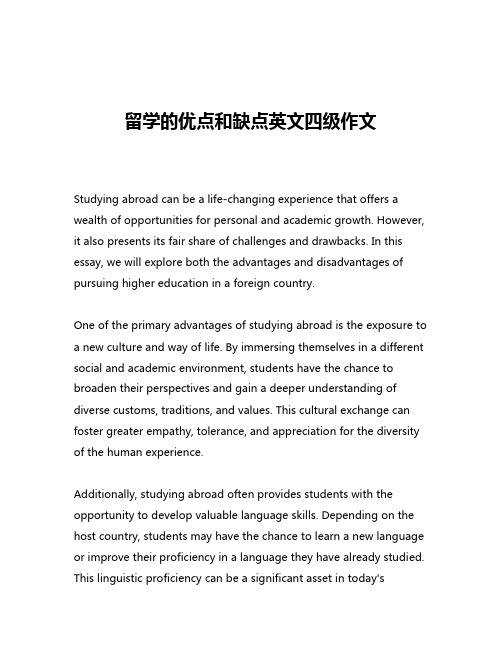
留学的优点和缺点英文四级作文Studying abroad can be a life-changing experience that offers a wealth of opportunities for personal and academic growth. However, it also presents its fair share of challenges and drawbacks. In this essay, we will explore both the advantages and disadvantages of pursuing higher education in a foreign country.One of the primary advantages of studying abroad is the exposure to a new culture and way of life. By immersing themselves in a different social and academic environment, students have the chance to broaden their perspectives and gain a deeper understanding of diverse customs, traditions, and values. This cultural exchange can foster greater empathy, tolerance, and appreciation for the diversity of the human experience.Additionally, studying abroad often provides students with the opportunity to develop valuable language skills. Depending on the host country, students may have the chance to learn a new language or improve their proficiency in a language they have already studied. This linguistic proficiency can be a significant asset in today'sincreasingly globalized job market, as employers highly value candidates with multilingual capabilities.Another advantage of studying abroad is the opportunity to gain independence and self-reliance. Living and studying in a foreign country often requires students to navigate unfamiliar systems, manage their finances, and make decisions independently. This can lead to personal growth, increased problem-solving skills, and the development of self-confidence – all of which are valuable traits in both academic and professional settings.Furthermore, studying abroad can enhance a student's academic experience by exposing them to different teaching methodologies, research approaches, and educational systems. This exposure can challenge students to think critically, adapt to new learning environments, and broaden their intellectual horizons. Additionally, many universities abroad offer specialized programs or courses that may not be available in the student's home country, allowing them to pursue their academic interests in a unique and enriching setting.However, studying abroad also comes with its fair share of challenges and drawbacks. One of the primary disadvantages is the financial burden it can place on students and their families. Studying in a foreign country often comes with higher tuition fees, living expenses, and travel costs, which can be a significant financial strain,especially for students from lower-income backgrounds.Another potential disadvantage is the cultural adjustment and homesickness that many students experience. Adapting to a new cultural environment, navigating language barriers, and being separated from family and friends can be emotionally and psychologically taxing. This can lead to feelings of isolation, loneliness, and stress, which can negatively impact a student's academic performance and overall well-being.Additionally, studying abroad can present logistical challenges, such as navigating unfamiliar bureaucratic systems, securing appropriate visas and documentation, and finding suitable housing and transportation. These practical hurdles can add to the stress and anxiety that students may experience during their time abroad.Another potential disadvantage of studying abroad is the disruption to academic progress and the potential for delays in degree completion. Transferring credits between institutions, adjusting to different academic calendars, and navigating course equivalencies can be complex and time-consuming, which can prolong a student's time to graduation.Despite these challenges, the advantages of studying abroad often outweigh the drawbacks. The personal growth, cultural enrichment,and academic benefits that students can gain from this experience can be truly transformative, shaping their perspectives, skills, and future career prospects.In conclusion, the decision to study abroad is a complex one that requires careful consideration of both the advantages and disadvantages. While it presents unique challenges, the opportunity to immerse oneself in a new cultural and academic environment can be a truly rewarding and life-changing experience. Ultimately, the decision to study abroad should be based on a student's individual goals, resources, and willingness to embrace the adventure and personal growth that comes with this opportunity.。
关于留学利弊的英文作文
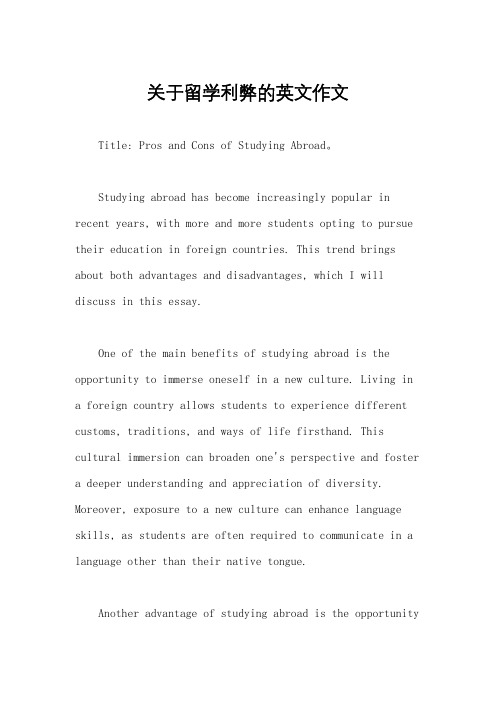
关于留学利弊的英文作文Title: Pros and Cons of Studying Abroad。
Studying abroad has become increasingly popular in recent years, with more and more students opting to pursue their education in foreign countries. This trend brings about both advantages and disadvantages, which I will discuss in this essay.One of the main benefits of studying abroad is the opportunity to immerse oneself in a new culture. Living in a foreign country allows students to experience different customs, traditions, and ways of life firsthand. This cultural immersion can broaden one's perspective and foster a deeper understanding and appreciation of diversity. Moreover, exposure to a new culture can enhance language skills, as students are often required to communicate in a language other than their native tongue.Another advantage of studying abroad is the opportunityfor personal growth and development. Moving to a newcountry requires students to step out of their comfortzones and adapt to unfamiliar environments. This experience fosters independence, resilience, and problem-solvingskills, which are valuable traits that can benefit individuals throughout their lives. Additionally, studying abroad provides opportunities for self-discovery and self-reflection, as students navigate new challenges and forge their own paths.Furthermore, studying abroad can open doors to career opportunities. Many employers value the skills and experiences gained from living and studying in a foreign country. International experience demonstrates adaptability, cultural competency, and global awareness, qualities that are increasingly important in today's interconnected world. Additionally, studying abroad may provide access to unique academic programs, research opportunities, and internships that may not be available in one's home country.Despite these advantages, studying abroad also presents challenges and drawbacks. One potential disadvantage is thefinancial cost. Tuition fees, living expenses, travel costs, and other associated expenses can add up quickly, making studying abroad prohibitively expensive for some students. Additionally, currency exchange rates and fluctuating economies can further impact the affordability of studyingin certain countries.Another challenge of studying abroad is the potentialfor homesickness and cultural adjustment issues. Being away from family and friends can be difficult, especially for prolonged periods. Moreover, adapting to a new culture, language, and educational system can be overwhelming and stressful for some students. Feelings of isolation, loneliness, and cultural shock are not uncommon among international students.Furthermore, studying abroad may pose academic challenges. Differences in teaching styles, grading systems, and academic expectations can be confusing and challenging for students who are accustomed to a different educational system. Additionally, language barriers may hinder academic performance and communication with professors and peers.In conclusion, studying abroad offers a myriad of opportunities for personal, academic, and professional growth. From cultural immersion and language acquisition to career advancement and personal development, the benefits of studying abroad are vast. However, it is essential to consider the potential challenges and drawbacks, such as financial costs, cultural adjustment issues, and academic challenges. Ultimately, the decision to study abroad should be carefully weighed, taking into account individual goals, preferences, and circumstances.。
大学英语作文留学的利弊,留学的利弊
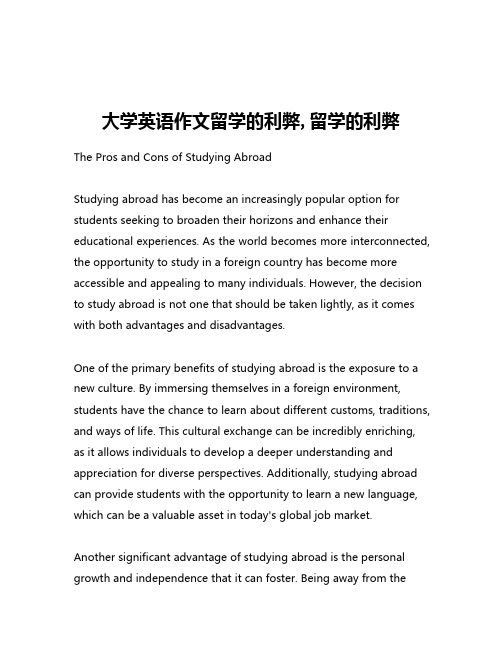
大学英语作文留学的利弊,留学的利弊The Pros and Cons of Studying AbroadStudying abroad has become an increasingly popular option for students seeking to broaden their horizons and enhance their educational experiences. As the world becomes more interconnected, the opportunity to study in a foreign country has become more accessible and appealing to many individuals. However, the decision to study abroad is not one that should be taken lightly, as it comes with both advantages and disadvantages.One of the primary benefits of studying abroad is the exposure to a new culture. By immersing themselves in a foreign environment, students have the chance to learn about different customs, traditions, and ways of life. This cultural exchange can be incredibly enriching, as it allows individuals to develop a deeper understanding and appreciation for diverse perspectives. Additionally, studying abroad can provide students with the opportunity to learn a new language, which can be a valuable asset in today's global job market.Another significant advantage of studying abroad is the personal growth and independence that it can foster. Being away from thecomfort of one's home country can push students out of their comfort zones, forcing them to navigate unfamiliar situations and make decisions on their own. This can lead to increased self-confidence, problem-solving skills, and adaptability – all of which are highly sought-after qualities in the workforce.Moreover, studying abroad can enhance a student's academic and professional prospects. Many universities around the world offer unique programs and courses that may not be available in one's home country. By taking advantage of these opportunities, students can gain specialized knowledge and skills that can give them a competitive edge in their future careers. Additionally, studying abroad can provide valuable networking opportunities, as students have the chance to connect with peers and professionals from different backgrounds.However, there are also several drawbacks to studying abroad that should be considered. One of the primary challenges is the financial burden it can place on students and their families. Studying in a foreign country often comes with higher tuition fees, living expenses, and travel costs, which can be a significant financial strain. This can be particularly problematic for students from lower-income backgrounds, who may not have the resources to cover the additional expenses.Another potential downside of studying abroad is the emotional and psychological impact it can have on students. Being away from one's support system, family, and friends can be isolating and overwhelming, especially during the initial adjustment period. This can lead to feelings of homesickness, anxiety, and depression, which can negatively affect a student's academic performance and overall well-being.Furthermore, studying abroad can also present logistical challenges, such as navigating bureaucratic processes, securing housing, and adapting to a different educational system. These practical considerations can be time-consuming and stressful, and may require a significant investment of time and effort.Despite these drawbacks, the benefits of studying abroad often outweigh the challenges. By carefully weighing the pros and cons, students can make an informed decision about whether studying abroad is the right choice for them. Ultimately, the decision to study abroad is a highly personal one, and should be based on an individual's goals, interests, and resources.In conclusion, studying abroad is a complex and multifaceted experience that offers both advantages and disadvantages. While it can provide valuable cultural, personal, and academic opportunities, it also comes with significant financial and emotional costs. Bythoroughly considering these factors, students can make the best decision for their educational and personal development.。
留学利弊 英文作文
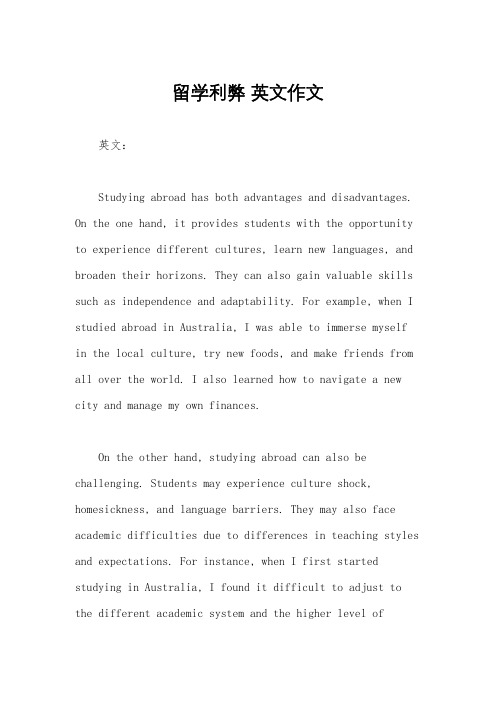
留学利弊英文作文英文:Studying abroad has both advantages and disadvantages. On the one hand, it provides students with the opportunity to experience different cultures, learn new languages, and broaden their horizons. They can also gain valuable skills such as independence and adaptability. For example, when I studied abroad in Australia, I was able to immerse myself in the local culture, try new foods, and make friends from all over the world. I also learned how to navigate a new city and manage my own finances.On the other hand, studying abroad can also be challenging. Students may experience culture shock, homesickness, and language barriers. They may also face academic difficulties due to differences in teaching styles and expectations. For instance, when I first started studying in Australia, I found it difficult to adjust to the different academic system and the higher level ofacademic rigor. I also struggled with the Australian accent and had trouble understanding my professors and classmates.In conclusion, studying abroad can be a rewarding but also a challenging experience. It depends on theindividual's goals, expectations, and ability to adapt to new environments. As for me, I believe that studying abroad has helped me grow as a person and has given me a unique perspective on the world.中文:留学有利有弊。
出国留学利弊的英语作文
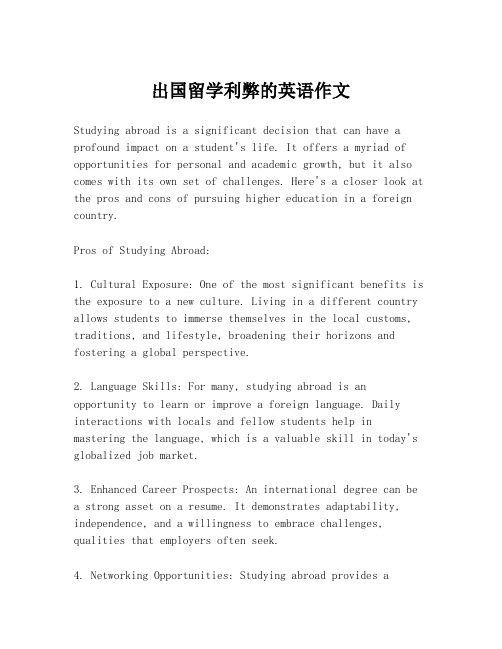
出国留学利弊的英语作文Studying abroad is a significant decision that can have a profound impact on a student's life. It offers a myriad of opportunities for personal and academic growth, but it also comes with its own set of challenges. Here's a closer look at the pros and cons of pursuing higher education in a foreign country.Pros of Studying Abroad:1. Cultural Exposure: One of the most significant benefits is the exposure to a new culture. Living in a different country allows students to immerse themselves in the local customs, traditions, and lifestyle, broadening their horizons and fostering a global perspective.2. Language Skills: For many, studying abroad is an opportunity to learn or improve a foreign language. Daily interactions with locals and fellow students help in mastering the language, which is a valuable skill in today's globalized job market.3. Enhanced Career Prospects: An international degree can bea strong asset on a resume. It demonstrates adaptability, independence, and a willingness to embrace challenges, qualities that employers often seek.4. Networking Opportunities: Studying abroad provides aplatform to build an international network of friends, professors, and professionals, which can be beneficial for future collaborations and career opportunities.5. Personal Development: Living independently in a foreign country can lead to significant personal growth. Studentslearn to adapt to new environments, solve problems, and become more self-reliant.Cons of Studying Abroad:1. Financial Burden: Studying abroad can be expensive.Tuition fees, living expenses, and travel costs can add up quickly, potentially leading to significant student debt.2. Homesickness: Being away from family and friends can be emotionally challenging. The initial adjustment period can be tough, and feelings of loneliness and homesickness are common.3. Cultural Shock: Adjusting to a new culture can be disorienting. Differences in social norms, food, and daily routines can lead to culture shock, which might affect a student's well-being and academic performance.4. Academic Challenges: Different educational systems and teaching styles can be a hurdle. Students might find itdifficult to adapt to new academic expectations and grading systems.5. Safety Concerns: Safety is a paramount concern forstudents studying abroad. It's crucial to be aware of locallaws, customs, and potential risks to ensure personal safety.In conclusion, studying abroad is a life-changing experience that offers numerous benefits, including cultural enrichment, language proficiency, and personal growth. However, it is not without its drawbacks, such as financial strain and potential homesickness. Prospective students should weigh these factors carefully to make an informed decision that aligns with their personal and academic goals.。
留学的利弊英语作文
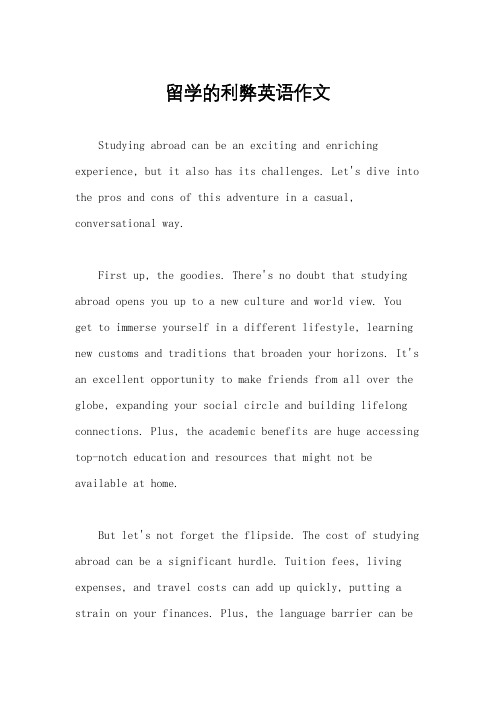
留学的利弊英语作文Studying abroad can be an exciting and enriching experience, but it also has its challenges. Let's dive into the pros and cons of this adventure in a casual, conversational way.First up, the goodies. There's no doubt that studying abroad opens you up to a new culture and world view. You get to immerse yourself in a different lifestyle, learning new customs and traditions that broaden your horizons. It's an excellent opportunity to make friends from all over the globe, expanding your social circle and building lifelong connections. Plus, the academic benefits are huge accessing top-notch education and resources that might not be available at home.But let's not forget the flipside. The cost of studying abroad can be a significant hurdle. Tuition fees, living expenses, and travel costs can add up quickly, putting a strain on your finances. Plus, the language barrier can betough to overcome, especially if you're not fluent in the local language. Navigating a new culture can also be challenging, as customs and social norms might be vastly different from what you're used to.And then there's the homesickness. Being away from your family and friends for extended periods can be tough, especially during holidays and special occasions. It takes a lot of adjustment and resilience to cope with the loneliness and homesickness that can creep up.On the other hand, studying abroad also builds resilience and independence. You learn to handle problems and challenges on your own, developing a sense of self-reliance that's invaluable in life. It's an opportunity to grow and evolve as a person, stepping out of your comfort zone and embracing new experiences.In conclusion, studying abroad is a mixed bag. It's an enriching experience that broadens your horizons and builds character, but it also comes with its challenges. Whetherit's worth it or not depends on your personal goals, financial situation, and willingness to。
- 1、下载文档前请自行甄别文档内容的完整性,平台不提供额外的编辑、内容补充、找答案等附加服务。
- 2、"仅部分预览"的文档,不可在线预览部分如存在完整性等问题,可反馈申请退款(可完整预览的文档不适用该条件!)。
- 3、如文档侵犯您的权益,请联系客服反馈,我们会尽快为您处理(人工客服工作时间:9:00-18:30)。
2015年12月大学英语四级作文题目:留学利弊
题目:
1. 出国留学有很多好处
2. 出国留学也会遇到很多难题
3. 你的选择
例句:
出国留学的好处:
接触到全新的想法和趋势,增加知识,拓宽视野
Being exposed to entirely new ideas and trends,they can enrich their knowledge and expand their horizons. 在国外生活,更快地掌握外遇
by living and studying in a foreign country, one can improve his foreign language much faster than at home. 减少对父母的依靠
A great gift a parent can give is to let a child spread his /her wings and be independent
Reduce their dependence on their parents
出国留学遇到的困难:语言难,沟通难learning a foreign language and communicating smoothly with the local people is far from an easy thing at the outset for most people. 适应当地饮食,习俗,思想和气候
It also takes time for students to adapt themselves to a new diet,custom,set of ideas and even the climate。
